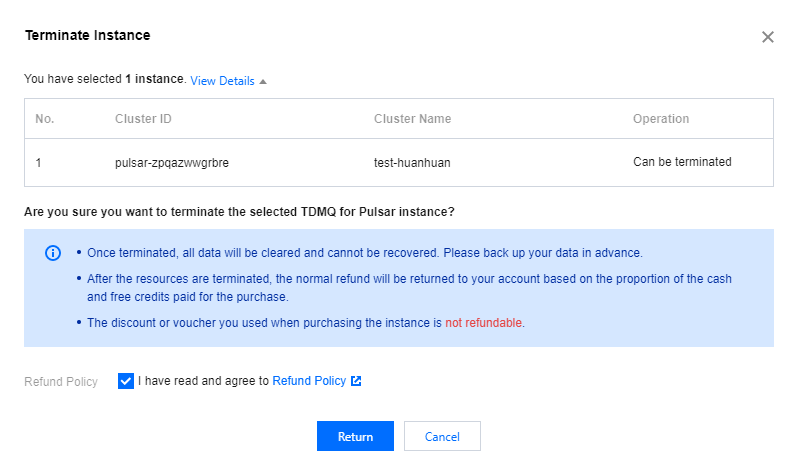- Release Notes and Announcements
- Product Introduction
- Purchase Guide
- Getting Started
- Developer Guide
- Operation Guide
- Best Practices
- API Documentation
- History
- Introduction
- API Category
- Making API Requests
- Cluster APIs
- Namespace APIs
- Topic APIs
- Message APIs
- CMQ Message APIs
- CMQ Management APIs
- UnbindCmqDeadLetter
- RewindCmqQueue
- ModifyCmqTopicAttribute
- ModifyCmqSubscriptionAttribute
- ModifyCmqQueueAttribute
- DescribeCmqTopics
- DescribeCmqTopicDetail
- DescribeCmqSubscriptionDetail
- DescribeCmqQueues
- DescribeCmqQueueDetail
- DescribeCmqDeadLetterSourceQueues
- DeleteCmqTopic
- DeleteCmqSubscribe
- DeleteCmqQueue
- CreateCmqTopic
- CreateCmqSubscribe
- CreateCmqQueue
- Other APIs
- Environment Role APIs
- TDMQ for RabbitMQ APIs
- RocketMQ APIs
- DescribeRocketMQVipInstanceDetail
- DescribeRocketMQMsg
- ModifyRocketMQTopic
- ModifyRocketMQNamespace
- ModifyRocketMQGroup
- ModifyRocketMQCluster
- DescribeRocketMQTopics
- DescribeRocketMQNamespaces
- DescribeRocketMQGroups
- DescribeRocketMQClusters
- DescribeRocketMQCluster
- DeleteRocketMQTopic
- DeleteRocketMQGroup
- DeleteRocketMQCluster
- CreateRocketMQTopic
- CreateRocketMQNamespace
- CreateRocketMQGroup
- CreateRocketMQCluster
- TDMQ for RocketMQ APIs
- Production and Consumption APIs
- Data Types
- Error Codes
- SDK Documentation
- FAQs
- TDMQ Policy
- Service Level Agreement
- General References
- Contact Us
- Glossary
- Release Notes and Announcements
- Product Introduction
- Purchase Guide
- Getting Started
- Developer Guide
- Operation Guide
- Best Practices
- API Documentation
- History
- Introduction
- API Category
- Making API Requests
- Cluster APIs
- Namespace APIs
- Topic APIs
- Message APIs
- CMQ Message APIs
- CMQ Management APIs
- UnbindCmqDeadLetter
- RewindCmqQueue
- ModifyCmqTopicAttribute
- ModifyCmqSubscriptionAttribute
- ModifyCmqQueueAttribute
- DescribeCmqTopics
- DescribeCmqTopicDetail
- DescribeCmqSubscriptionDetail
- DescribeCmqQueues
- DescribeCmqQueueDetail
- DescribeCmqDeadLetterSourceQueues
- DeleteCmqTopic
- DeleteCmqSubscribe
- DeleteCmqQueue
- CreateCmqTopic
- CreateCmqSubscribe
- CreateCmqQueue
- Other APIs
- Environment Role APIs
- TDMQ for RabbitMQ APIs
- RocketMQ APIs
- DescribeRocketMQVipInstanceDetail
- DescribeRocketMQMsg
- ModifyRocketMQTopic
- ModifyRocketMQNamespace
- ModifyRocketMQGroup
- ModifyRocketMQCluster
- DescribeRocketMQTopics
- DescribeRocketMQNamespaces
- DescribeRocketMQGroups
- DescribeRocketMQClusters
- DescribeRocketMQCluster
- DeleteRocketMQTopic
- DeleteRocketMQGroup
- DeleteRocketMQCluster
- CreateRocketMQTopic
- CreateRocketMQNamespace
- CreateRocketMQGroup
- CreateRocketMQCluster
- TDMQ for RocketMQ APIs
- Production and Consumption APIs
- Data Types
- Error Codes
- SDK Documentation
- FAQs
- TDMQ Policy
- Service Level Agreement
- General References
- Contact Us
- Glossary
Overview
You can delete a TDMQ for Pulsar cluster when it is no longer needed.
The lifetime of a TDMQ for Pulsar cluster refers to the states a cluster goes through from startup to release. By managing the cluster reasonably from startup to deletion, you can ensure that applications running on the cluster can provide services efficiently and economically. The cluster has the following statuses:
Status | Attribute | Description |
Creating | Intermediate status | After the cluster is created, it enters the status before running. |
Normal | Steady status | The cluster is in a normal operating status, indicating that the condition of your nodes, disk utilization rate, and other metrics are all within the normal range. |
Deleting | Intermediate status | The cluster is being deleted through the console or API. |
Isolated | Intermediate status | The cluster is overdue and has entered a 7-day isolation period. Instances in isolation cannot produce or consume, and data and configurations saved within the cluster will not be deleted. |
Provisioning Failed | Intermediate status | You have purchased a cluster through the console or API and the charge was successful, but the cluster allocation failed. In this case, contact us. |
Deletion Failed | Steady status | The cluster was manually deleted or not renewed within 7 days of its expiration, resulting in TDMQ for Pulsar failing to release resources. |
Directions
Manual Deletion
For clusters that have not yet expired, you can choose to manually delete them. The steps are as follows:
1. Log in to the TDMQ for Pulsar console.
2. In the left sidebar, choose Pulsar > Cluster Management. On the cluster management page, click the operation column's More> Return.
3. In the instance termination confirmation pop-up, check the Refund Information, and click Return to delete the cluster.

Note:
After termination, all data will be cleared and cannot be recovered. Backup data in advance.
Automatic Deletion upon Expiration/Overdue
After an instance expires/is overdue, it can be retained in the console for up to 7 calendar days. If you complete the renewal within 7 days after expiry, you can continue to use it. For more details, see Payment Overdue.
If you do not renew your TDMQ for Pulsar cluster within 7 days (including the 7th day) of its expiration, the system will start releasing resources at midnight on the 8th day after expiration. The data in the expired instances will be cleared and cannot be recovered.
Note:
Clusters in a quarantined state cannot produce or consume, but the data and configurations saved within the cluster will not be deleted.
For clusters in a quarantined state within 7 days, you can go to the cluster list page in the console, and click Renew in the operation column. Once the renewal is successful, the cluster will return to a running state and can be used normally.

 Yes
Yes
 No
No
Was this page helpful?